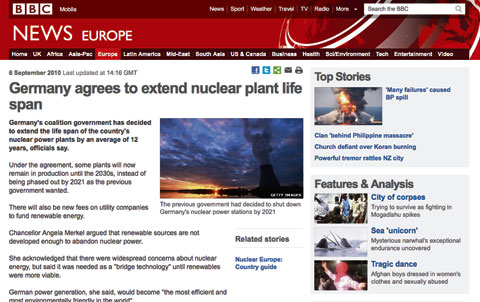Germany’s coalition government has decided to extend the life span of the country’s nuclear power plants. Should the Netherlands follow suit?
’Under the agreement, some plants will now remain in production until the 2030’s, instead of being phased out by 2021 as the previous government wanted’, BBC News reported on its website. It also mentions that German Chancellor Angela Merkel regards nuclear power as a ‘bridge technology’ until renewables were more viable.
“The Dutch government has chosen another bridge technology”, says Professor Wil Thissen (Technology, Policy and Management). “Namely: carbon capture and sequestration (CCS).” CCS is a technology that is used to store CO2 from coal-fired plants underground. “The German decision also makes sense from an economic point of view, because phasing out functioning plants would mean destruction of capital. Personally I think it’s a good decision. Not everyone will agree, because with nuclear energy there are always ethical issues involved.”
Dr.ir. Behnam Taebi (TBM), who recently wrote his PhD-thesis on the ethics of nuclear energy, has been following the nuclear debate in Germany closely. “I observed once again that a very important issue, the issue of intergenerational justice, was missing in the debate”, he says. “Who will be dealing with the long-lived nuclear waste? Is that us or future generations?” One possible way of dealing with the waste within this generation is the further development of a new nuclear technique under development called Partitioning and Transmutation (P&T), with which the waste life-time could be reduced substantially to a couple of hundred years, instead of tens to hundreds thousands of years.
”Part of the deal with nuclear power producers is the introduction of a new tax on nuclear energy. The income from this new fee, estimate at 2.3 billion euros annually, will be used to boost development of renewable energy sources. “A good idea”, says Thissen. “You need to look at the whole energy system. Large investments in non-sustainable energy may reduce the incentives to invest in renewables. By requiring nuclear energy producers to contribute to a renewable development fund is a good thing.”
So should the Netherlands, where investors have announced they are ready to invest in new nuclear plants, follow the German example? “Germany is not investing in new plants”, Thissen corrects, “they’re merely keep existing plans open longer, just as the Dutch have done with the nuclear plant in Borssele. Besides, the context is different. The Netherlands has opted to build four new coal-fired plants. Our research indicates that this extra coal power will flood the electricity market. Adding nuclear energy to that would be unwise. Besides, if we do need nuclear power, we can always buy it from France. Or Germany.”
Life cycle of a paper cup: designers yearn to develop stunning, lovely-to-use products; engineers want products that are simple to produce and distribute; and users desire a good standard of living, enjoying their freedoms in a comfortable world. A simple paper cup is an extremely complex ecosystem that combines all these desires. Helping to saving our eco-system is however a daunting but necessary task for designers, engineers and users, if there is to be water for future generations to drink in whatever kind of cup – paper, glass or plastic. (Illustration: Ricardo Mejia, MSc, IDE)



Comments are closed.